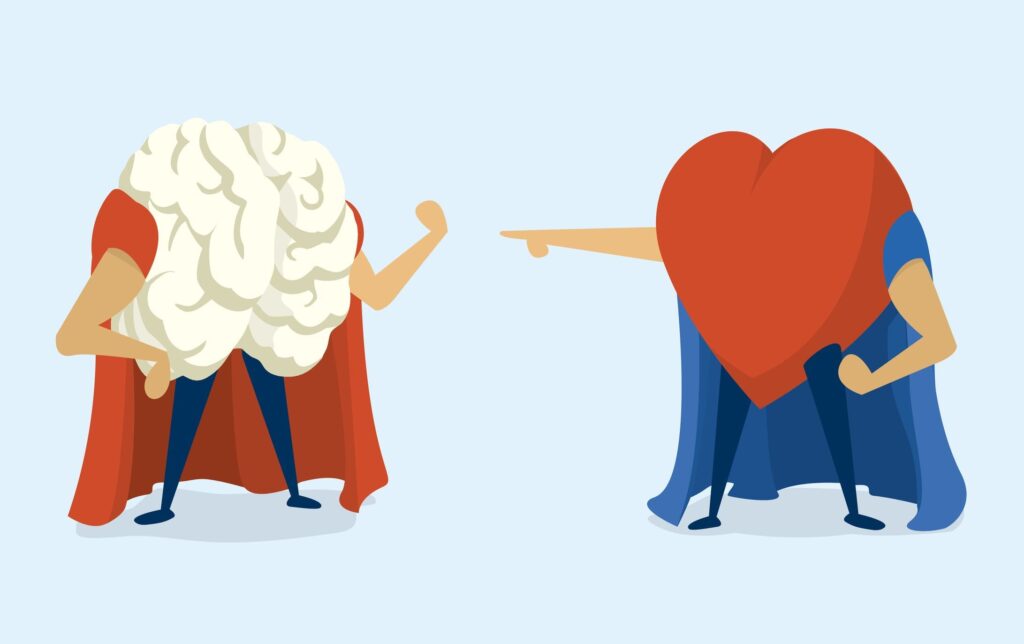Contents
What Is Emotional Intelligence?
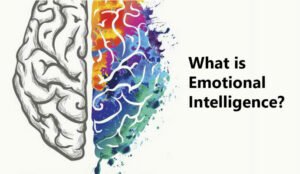
Emotional intelligence is one’s ability to identify, assess, regulate, and control the emotions of oneself, others, and groups. Emotional intelligence includes four aspects: perceiving emotion accurately in oneself and in others, understanding the causes of one’s own emotions and those of others. Using this information to guide one’s thinking and actions to promote personal growth and good relationships with other people, and manage emotions so that they are appropriate. Below is the emotional intelligence test to understand yourself better.
This intelligence was first termed as the ability to be aware of and express your feelings. And that of others, in a way that helps you to manage difficult situations.
Emotional intelligence is closely related to concepts such as emotional literacy, emotional quotient (EQ), psychological awareness, and emotional style. The term “emotional intelligence” is believed to have been coined and first popularized by the author and psychologist Peter Salovey, and later further developed by other researchers such as John Mayer and differing from those, Daniel Goleman. Emotional intelligence is composed of four different, but equally important personal skills:
- Self-awareness
- Self-regulation
- Social awareness
- Relationship management
These skills are all crucial to understanding your emotions and those around you. So that you know when to push yourself or back off from a situation. It can also help you find the right words for difficult conversations. Understanding your emotions can help you understand what other people are going through as well.
Emotional Intelligence Test
The following test will help you understand your current emotional intelligence level. Please answer the questions as sincerely as you can.
1) I like meeting new people
- True
- False
2) When someone disagrees with me, I feel threatened
- True
- False
3) I get upset when the boss criticizes my work
- True
- False
4) Some of my friends say that they don’t really know what I’m thinking
- True
- False
5) I don’t like to meet new people unless they’re really friendly
- True
- False
6) When my boss asks me for a report, I usually ignore it until he or she asks again
- True
- False
7) People see me as someone who always has a cheerful disposition
- True
- False
8) After an argument with somebody, I usually think that I was right and they were wrong
- True
- False
9) When there is a new project, I prefer to work alone
- True
- False
10) When someone really disagrees with me, I often feel uncomfortable
- True
- False
11) If there’s a disagreement about something with somebody, my first reaction is to find out what the other person thinks
- True
- False
12) I get very anxious and upset during an argument with somebody
- True
- False
13) When there’s a problem at work, I usually discuss it on my own first before taking it to the rest of the group.
- True
- False
14) After a disagreement with somebody, if they apologize for something, I can easily forgive them.
- True
- False
15) People often think that I am not really listening to them when they are talking to me.
- True
- False
16) When somebody is angry with me, I usually find out what the problem is before trying to solve it.
- True
- False
17) Sometimes I will ignore my friends if they try to talk about a problem rather than discuss it with them.
- True
- False
18) I get very nervous before talking to new people even if they are friendly.
- True
- False
19) After an argument with somebody, I usually feel that things are back to normal between us.
- True
- False
20) When there is a problem at work, I prefer to discuss it on my own first before bringing others into the discussion.
- True
- False
21) When I disagree with somebody, I am not afraid to let them know about it.
- True
- False
22) If someone has a problem at work, I feel that they should be able to sort it out by themselves rather than discussing it with others.
- True
- False
23) After an argument with somebody, if they apologize for something, I immediately think that they are wrong.
- True
- False
24) When there is a problem at work, I usually discuss it on my own first before discussing it with the whole group.
- True
- False
25) If somebody has a problem which they want to talk about, I prefer to discuss it with them even if there are others in the room.
- True
- False
26) If I don’t understand a task at work, I will ask somebody before trying to do it.
- True
- False
27) When there is a problem at work, I prefer to discuss it on my own first before discussing it with another person.
- True
- False
28) After an argument with somebody, if they apologize for something. I may accept their apology, but I don’t forget what they did.
- True
- False
29) If somebody has a problem at work. I usually discuss it with them before discussing it with others.
- True
- False
30) When there is a disagreement about something with somebody, my first reaction is to argue about the issue itself rather than find out first why the other person thinks that way.
- True
- False
Emotional Intelligence Test- Answers
Based on your answers, this test will determine your emotional intelligence. The test asked people questions about their emotions and then assigned them a level of emotional intelligence with thirty questions in total. Then at the end, it tells you your score with an interpretation of how confident they feel about the result. The questions in this test are made to see how good a person is at following social etiquette and being mindful of the feelings of others.
The answer to number twenty is “TRUE” which means that the person taking this test has scored high in their Emotional Intelligence.
For questions 21-30 here’s what it means: “While you may sometimes wish your colleagues would speak up more, you realize the value in providing them a safe space to share. You know that everybody has different strengths, and you’re generally willing to let others take the lead. You do sometimes feel uncomfortable when the entire group is discussing one person’s problem. But you’ve found ways to cope with that discomfort.”
And as for questions 1-5: “Your high EQ means that you’re generally sensitive to other people’s feelings and perspectives. You also have a fair amount of empathy, which is considered one of the most important elements of emotional intelligence. But this doesn’t mean that you’re quick to give up your own opinions or compromise your values for someone else’s sake.”
How To Use This Test?
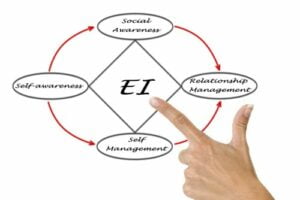 Take a look at the following statements and consider how much you agree or disagree with them. Please answer according to what really reflects your opinions and experiences, rather than what you think your opinions and experiences should be. Please respond based on the past few months.
Take a look at the following statements and consider how much you agree or disagree with them. Please answer according to what really reflects your opinions and experiences, rather than what you think your opinions and experiences should be. Please respond based on the past few months.
- Understanding your emotions can help you understand what other people are going through as well.
- An emotional intelligence test is a quiz or survey of questions designed to assess your level of emotional intelligence. The results will tell you which of your skills need improving and how you can work on them.
- Self-regulation is the ability to control impulses and delay gratification, as well as manage emotional reactions without falling prey to stress or anxiety.
The test was designed to measure an individual’s emotional intelligence which ultimately shows how capable a person is at behaving in social settings and controlling their impulses. In order to increase your emotional intelligence. It is important to foster relationships, keep an open mind, and learn new things.
Tips For Increasing Your Emotional Intelligence
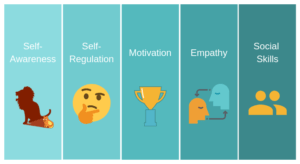
Emotional intelligence is a skill that can be acquired as it relates to understanding one’s own emotions as well as those of others. When everyone understands their feelings, they are better equipped to communicate with each other because no one feels misunderstood. Individual is also better able to control their impulses and anger. This can help them maintain a positive mood. By starting a conversation about emotions with the people around you. You will be surprised by how much easier it is to talk about sensitive topics. Because your feelings are not going to get hurt as easily. These are some tips that you should follow for increasing your emotional intelligence-
Foster close relationships– “People with high emotional intelligence have strong social ties with family, friends, and colleagues.”
Learn new things– “Being open to new experiences can help build your emotional intelligence.”
Keep an open mind– “Empathy is one of the most important elements of emotional intelligence. This means being able to perceive people’s feelings and understand what they are thinking. Being flexible and adaptable means that you will be more likely to look at situations from other people’s points of view.”
Avoid conflict– “Disagreements with others are inevitable, but emotional intelligence can help you to tackle these in a constructive way. Another skill that comes under this category is the ability to deal with difficult situations where emotions are running high.”
Learn new coping strategies for dealing with tough emotions– “Using certain strategies when feeling negative emotions. Such as avoiding the situation that’s causing you stress or taking time to relax and calm down–can help reduce these feelings.”
Emotional Intelligence Benefits
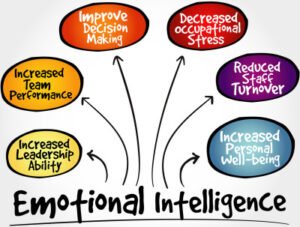 People who have emotional intelligence are able to identify certain emotions, as well as show empathy for others. When making a decision, they think of how it will affect other people and not just themselves. There are many reasons why it is beneficial to have high emotional intelligence. People with high emotional intelligence are often better able to cope with stress. And solve their own problems without depending on somebody else to do it for them. They’re also more likely to have a happy, fulfilling social life. High EI people know how to interact well in different social situations and aren’t easily offended or upset by other people.
People who have emotional intelligence are able to identify certain emotions, as well as show empathy for others. When making a decision, they think of how it will affect other people and not just themselves. There are many reasons why it is beneficial to have high emotional intelligence. People with high emotional intelligence are often better able to cope with stress. And solve their own problems without depending on somebody else to do it for them. They’re also more likely to have a happy, fulfilling social life. High EI people know how to interact well in different social situations and aren’t easily offended or upset by other people.
Conclusion
You’re not alone. There are many reasons why having high emotional intelligence is beneficial. And it’s something that a person can learn over time through understanding your own emotions as well as those of others. The test was created to measure how emotionally intelligent you currently are which shows how capable you are at behaving in social settings and controlling impulses. Increasing your emotional intelligence involves fostering relationships, keeping an open mind, and learning new things. Like the different types of personalities or coping strategies for dealing with tough emotions. For example, avoiding the situation that’s causing stress. If you want help building up these skills so that they come naturally to you.
If you are looking for affordable Online Counseling MantraCare can help: Book a trial therapy session
